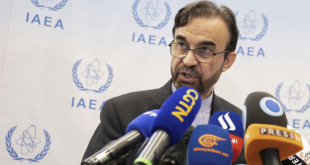The four years since US President Bush declared “Mission Accomplished” have been a legacy of missed opportunities, ineffectual plans, surges and course corrections that have always been too little, too late or both, critics say. Now it is 2007, and “everybody’s got a plan. And none of it is memorable,” said Judith Yaphe, a veteran Persian Gulf analyst at the National Defense University in Washington, D.C.
With 20 months left in Bush’s term, his Iraq policy may be at its final crossroads, with little time to show progress and big questions on several fronts.
The president and the Democratic-controlled Congress are sparring over a new bill to fund US forces in Iraq, after Bush’s veto last week of legislation that contained a timetable for withdrawing American forces.
Militarily, the “surge” of additional US troops into Iraq, now well under way, has failed to dent the overall level of violence.
Now the White House’s search for a “war czar” raises the question of who has been coordinating US involvement in Iraq and Afghanistan the past four years.
A team of West Wing players led by national-security adviser Stephen Hadley has tried to keep turf-conscious agencies marching in the same direction on military, political and reconstruction fronts. A few Bush aides say privately, however, that the White House probably should have recruited someone to oversee the war effort a year ago.
And now two key members of the White House team focused on the war are leaving. Meghan O’Sullivan, one of Hadley’s deputies who handled day-to-day coordination of Iraq, recently announced she is quitting. On Friday, Hadley’s deputy, J.D. Crouch, said he was departing next month.
On the diplomatic front, Secretary of State Condoleezza Rice has engineered a course change that positions Washington to negotiate with Syria and perhaps even Iran, two of Iraq’s important neighbors. But it remains to be seen whether the U-turn is in time to make a difference.
Although many countries announced plans to forgive Iraq’s debt, the neighbors didn’t rally in common cause during last week’s two-day conference in this Red Sea resort city. Saudi Arabia’s Sunni royal family has been cool to the Shiite Muslim-led government of Prime Minister Nouri al-Maliki, seeing it as a close ally of Iran.
This was at least the fourth such meeting on Iraq, starting with a post-war conference in Madrid in October 2003. None of the first three has had a tangible impact on the violence and instability there.
The lack of progress may account for the unusual announcement midway through the talks that Vice President Dick Cheney, who’s not known as a champion of diplomacy, will travel to Saudi Arabia, Egypt, Jordan and the United Arab Emirates starting Tuesday. His aim is to see what more can be done to stabilize Iraq and ensure that the US troop surge in Baghdad succeeds, a spokeswoman said.
A great deal was at stake in the talks in the Egyptian Red Sea resort.
Rice took a small step forward, opening lines of communication with Syria and Iran. The Bush administration has hopelessly tried for years to isolate those two countries.
She met with her Syrian counterpart, Walid Moallem, to discuss Iraq, the first high-level US-Syrian encounter in more than two years. The new US ambassador to Iraq, Ryan Crocker, and Rice aide David Satterfield had a brief, three-minute hallway encounter with a top Iranian diplomat on Friday. The United States and Iran haven’t had diplomatic relations since 1979.
But the outreach appeared tentative, and it came nearly five months after the bipartisan Iraq Study Group urged Bush to use diplomacy with Iran and Syria to help stabilize Iraq.
Rice’s decision to proceed with the two meetings came after heavy lobbying by the Iraqis, who say they’re weary of having their country serve as a battleground for outsiders, American and Iranian.
US officials said the two days of meetings went a long way toward easing suspicions among Iraq’s neighbors.
The highlight was the launching of an International Compact for Iraq, a five-year plan to step up foreign assistance in return for economic changes and serious attempts at political reconciliation by al-Maliki’s government.
But at this late stage, for real progress to be made, almost everything would have to go right in Iraq.
Al-Maliki’s government would have to make genuine efforts to reach a political deal that reconciles Iraq’s Shiites, Sunnis and Kurds, while curbing sectarian militias.
And the Iraqi parliament would have to pass long-delayed legislation to divide Iraq’s oil revenues equitably.
“We have reached a critical juncture,” Barham Salih, the Iraqi deputy prime minister, said in a brief interview. “We cannot afford to lose. And we cannot afford to give people false expectations.”
 Eurasia Press & News
Eurasia Press & News


